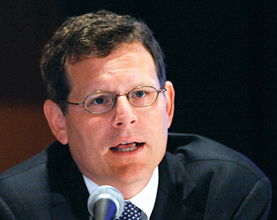Aug 29, 2012
 In the following interview, 2012-2013 ASCO President-Elect Clifford Hudis, MD, shares his thoughts on the importance of personalized medicine, ongoing challenges for the oncology community, and his plans and priorities for the Society.
In the following interview, 2012-2013 ASCO President-Elect Clifford Hudis, MD, shares his thoughts on the importance of personalized medicine, ongoing challenges for the oncology community, and his plans and priorities for the Society.
AC: What advances in oncology and breast cancer research do you hope to see throughout your term as ASCO President-Elect and beyond?
Dr. Hudis: Increasing personalization of care. It isn’t merely about selecting the right drug for the right tumor—it’s about understanding tumors in their heterogeneity; understanding the patient, his or her social environment, and what they can tolerate; and it’s about society’s tolerance of evermore complex and potentially expensive treatments.
AC: What are some challenges you anticipate in these areas?
Dr. Hudis: There is an overarching challenge of resource limitations—and I don’t think it has to be this way. We, as a society, make broad and sometimes very expensive decisions, and then at the same time will describe other less-expensive problems as “difficult.” We should reshape the discussion about health care, health care economics, and resources—especially in terms of the important cutting-edge research that the United States has traditionally been a leader in—so that its value is seen more broadly by a wider portion of our population.
At the same time, I think that a fair bit of the astonishing research advances in medicine are invisible to the public. We have an opportunity to share our successes to help build a consensus that this kind of research is really important and worth prioritizing.
AC: What will be your most important undertakings as ASCO President-Elect and then President?
Dr. Hudis: The rising cost of health care is going to be the problem we have to confront. We have an opportunity to manage and own some of the solutions to this problem for ourselves, rather than allowing it to be inflicted upon us from the outside. The only way we’re going to be the best advocates for our patients and our community is if we can rise to this challenge.
The second issue is health care information technology—and in many ways it’s parallel to the challenge of the rising cost of health care. There is an unstoppable wave of digitalization of the electronic medical record and the ways in which we transmit and communicate that information. Up until now, we’ve seen the establishment of a Tower of Babel—and this is unfortunate, but still correctable. ASCO has an unbelievable opportunity in oncology to contribute to the solution.
ASCO’s rapid learning system [CancerLinQ™] and all of the programs needed to support it will enhance universal connectivity. This is critically important because it will allow for more efficient, better care; reduce costs and conserve resources; and allow us to get past technical problems, such as incompatible programs, so that we can focus where we really should—on the underlying science and delivery of empathic and humane health care.
Dr. Hudis is Chief of the Breast Cancer Medicine Service and an attending physician at Memorial Sloan-Kettering Cancer Center. He is also Professor in the Department of Medicine at Weill Cornell Medical College. He served on the ASCO Board of Directors as 2009-2012 Treasurer and will serve as 2013-2014 ASCO President.
